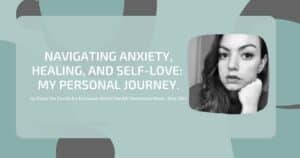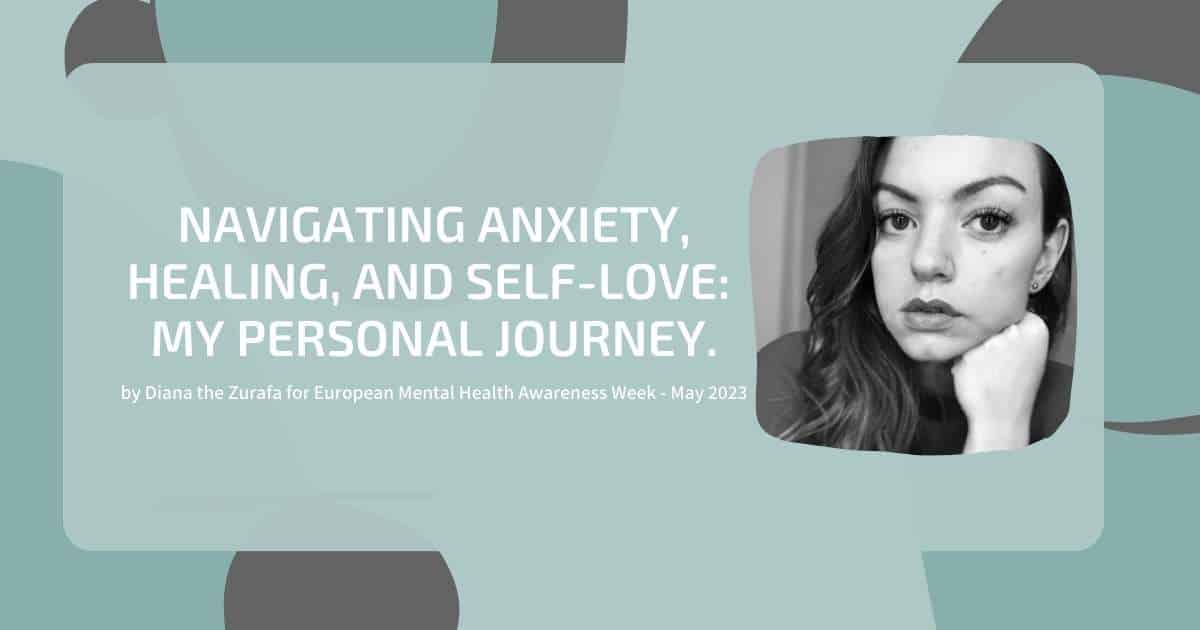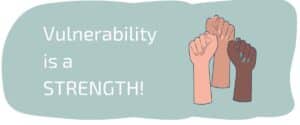
Navigating Anxiety, Healing, and Self-Love: My personal journey.
In recognition of European Mental Health Awareness Week, I wanted to share my personal experience with anxiety, hoping that this will help you feel less
Home » Navigating Anxiety, Healing, and Self-Love: My personal journey.

In recognition of European Mental Health Awareness Week, I wanted to share my personal experience with anxiety, hoping that this will help you feel less alone and give you hope that it is possible to manage it. For me, it was a challenging journey that stemmed from a toxic relationship in 2019, leaving me with PTSD, anxiety, and depression. It took me time and personal growth work through therapy and self-love, but I overcame my anxiety and found healing.
In this blog post, I want to help you believe that healing is possible. And also, take the opportunity to share knowledge about the topic, which despite being quite common, is still stigmatized. We will explore the nature of anxiety, its causes, the impact it can have, and potential solutions, including effective anxiety relief options that have helped me.
Anxiety can manifest in various ways, affecting both our physical and emotional well-being. I vividly remember the intense fear, worry, and restlessness that consumed me. It felt like a constant battle with my own thoughts, leaving me drained and overwhelmed. Simple triggers could escalate into full-blown panic attacks, making it difficult to function in everyday situations.
Living with anxiety meant constantly being on edge. Leaving the house became an ordeal as I feared running into my abuser or encountering situations that could reignite traumatic memories. Socializing with friends also became a source of anxiety, as the unknown loomed over me. It was a relentless struggle to regain a sense of safety and control. Does this feel familiar? If so, bear with me and know that it is possible to change it.
Anxiety often arises from various underlying factors. For me, it was the aftermath of a toxic relationship that left deep emotional scars. The experience of abuse triggered my fight-or-flight response, which led to the development of PTSD, and depression. Understanding the root causes of anxiety is crucial in finding effective coping mechanisms and embarking on the path to recovery.
Anxiety can exert a profound influence on our lives, hindering personal growth and impeding everyday activities. It becomes challenging to pursue our goals or engage in social interactions when anxiety is overpowering. My journey involved seeking therapy, which played a pivotal role in helping me regain control over my life and build resilience against anxiety’s grip. However, a thought that has always helped me, and still does, is the idea that anxiety is fear-based. That said, I got used to asking myself “What am I afraid of?” every time anxiety rises. This way I distract myself from the anxiety itself while I dig deeper to find the root cause.

While anxiety may never completely disappear, it is possible to manage and alleviate its impact. With the right support, therapy, and self-care practices, you can find relief and develop strategies to cope with anxiety. It took me time, but through dedicated effort, investing in my personal growth, and a renewed sense of self-love, today is rare an occasion in which anxiety feels overwhelming.

Anxiety can surface without an apparent reason or trigger. It’s important to recognize that it doesn’t always have a logical explanation and can arise unexpectedly. Acknowledging this complexity helps to avoid self-blame or invalidating one’s own experiences. But no matter the reason, remember to be kind to yourself. Don’t make yourself wrong for it, talk to you as you would talk to a friend struggling with the same situation.
When dealing with anxiety, it is essential to know when to seek support from a medical professional. While self-help strategies and coping mechanisms are effective, there are instances where professional intervention is necessary. If your anxiety significantly interferes with your daily life, relationships, or overall well-being, it’s crucial to consult with a healthcare provider or mental health specialist. They can provide an accurate diagnosis, offer tailored treatment options, and guide you through your healing journey. Remember, reaching out for professional help is not a sign of weakness but a courageous step towards prioritizing your mental health and finding long-term relief from anxiety.
Anxiety is a prevalent mental health condition, affecting millions of individuals worldwide. According to recent statistics, anxiety disorders are among the most common mental health conditions, with approximately 1 in 4 people experiencing anxiety at some point in their lives. These numbers emphasize the importance of raising awareness and providing support to those affected by anxiety.
That said, we hope you feel less alone and can be kind to yourself rather than making yourself wrong for it. We do invite you though to find strategies to help you cope and heal. I hope sharing a bit of my experience helped but everyone’s journey is unique. Make sure to find a combination of strategies that work best for you. It may take time and experimentation to discover the most effective techniques.
My journey with depression and anxiety taught me the importance of self-love, seeking support, and utilizing various strategies to alleviate its impact. Anxiety doesn’t have to define who we are or limit our potential for growth and happiness.
*If you’d like to learn more about personal growth, self-love, and building a life of joy, make sure to sign up for our newsletter here.

In recognition of European Mental Health Awareness Week, I wanted to share my personal experience with anxiety, hoping that this will help you feel less

Self-love has become a buzzword in today’s world, especially on social media. It’s heartening to see that as a society, we’re becoming more emotionally intelligent and self-aware. At the same time, like with many things, there is room for interpretation, which means that not everyone understands what self-love means in the same way.

We cannot talk about Personal Growth without talking about vulnerability, one cannot exist without the other. It takes a lot of courage and strength to open up and be honest about our feelings and needs.

The urge to evolve and better ourselves is a fundamental human trait we all share. Whether it’s through acquiring new knowledge, nurturing deep connections, or finding our life’s calling, personal growth is a vital aspect of our overall welfare. In this article, we will explore the meaning of personal growth, why it is important, what brings it about, the areas it encompasses, and examples of personal growth.

Read how to get started making a Vision Board and why it works! Learn everything about what a Vision Board is and why it leads to more connection and fulfilment.

For me a career is more to do things you are passionated about and enjoy, rather than earning a title. A title will not give you meaning or purpose in life. Read more about 4 easy steps to create the career you desire. Furthermore you will learn why a Vision Board can help you creating your perfect career!
© Self-Love Harbour 2025
Ahoy there! Ready to set sail on a journey of self-discovery and personal growth? Sign up for our newsletter and receive 10% off your first purchase. Don’t miss the boat, join our crew!